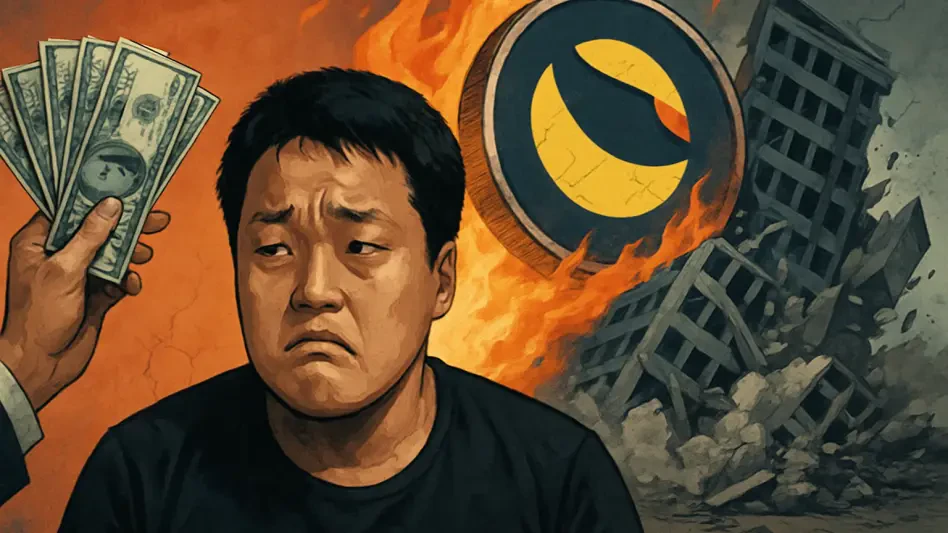In a stunning development that has reverberated through the cryptocurrency landscape, Do Kwon, the founder of Terraform Labs, has admitted guilt to fraud charges tied to the catastrophic $60 billion collapse of the Terra/Luna stablecoin ecosystem in 2022, shaking the digital asset sector to its core. This high-profile legal battle, unfolding in a New York federal court on August 12, has cast a harsh spotlight on the vulnerabilities and risks inherent in the digital asset sector. Kwon, a 33-year-old South Korean national, confessed to misleading investors with false assurances about the stability of TerraUSD (UST), a stablecoin pitched as a secure investment. The fallout from this collapse devastated countless individuals, eroding trust in the broader crypto market and exposing critical flaws in oversight. As a once-celebrated figure in blockchain innovation, Kwon’s courtroom appearance in handcuffs starkly contrasts with his earlier arrogance, often displayed through dismissive social media taunts. This case not only marks a personal reckoning for Kwon but also raises pressing questions about accountability and ethical standards in an industry often criticized for its lack of regulation.
Legal Repercussions and Accountability
Unpacking the Fraud Charges and Plea Terms
The gravity of Do Kwon’s guilty plea to charges of conspiracy to commit fraud and wire fraud cannot be overstated, as it represents a significant step toward accountability for the massive losses incurred by Terra investors. Initially facing an indictment with multiple charges that carried a potential sentence of up to 135 years, Kwon’s plea agreement has substantially reduced his exposure to a maximum of 25 years—20 for wire fraud and 5 for conspiracy. The Department of Justice has put forward a recommendation of no more than 12 years, yet the presiding judge, Paul Engelmayer, retains the authority to impose a stricter penalty. This uncertainty looms large over the upcoming sentencing, scheduled for December 11, highlighting the potential for a landmark ruling in crypto-related prosecutions. The plea terms reflect a balance between acknowledging the severity of the fraud and offering a framework for some leniency, though the final outcome remains in the hands of the court, keeping the stakes incredibly high for Kwon and the watching industry.
Beyond the immediate legal consequences, the plea agreement sheds light on the intricate nature of financial crimes in the digital asset space, where innovation often outpaces regulation. Kwon’s admission of knowingly deceiving investors about TerraUSD’s stability—claiming in 2021 that its peg was maintained by inherent mechanisms when a trading firm was actually involved—reveals a calculated effort to sustain public confidence. This deliberate misrepresentation fueled a false sense of security among investors, many of whom poured life savings into a system that was fundamentally unstable. The reduction in potential sentencing through the plea deal might be seen as a strategic move by prosecutors to secure a conviction without a protracted trial, yet it also underscores the challenge of quantifying justice in a case with such widespread financial devastation. As the sentencing date approaches, the crypto community and legal experts alike await a decision that could influence how future fraud cases are approached in this rapidly evolving sector.
Financial Obligations and Victim Compensation
As part of the plea agreement, Kwon faces substantial financial penalties aimed at addressing the immense harm caused by the Terra collapse, though full restitution for a $60 billion loss remains an unattainable goal. He has agreed to forfeit over $19 million plus interest, alongside paying restitution to affected investors and surrendering various properties. These measures are designed to offer some relief to those who suffered catastrophic losses when TerraUSD lost its peg to the dollar, triggering a domino effect across the ecosystem. While the forfeited amount is significant, it represents only a fraction of the total damage, leaving many victims with lingering financial burdens. The focus on restitution in this case signals an intent to prioritize investor recovery, even if the symbolic gesture cannot undo the widespread economic pain experienced by individuals who trusted in Kwon’s assurances of stability.
The financial penalties also serve as a broader warning to cryptocurrency leaders about the tangible consequences of deceptive practices, reinforcing that personal gain at the expense of investors will not go unchecked. Beyond the immediate monetary impact on Kwon, the restitution process highlights the logistical complexities of compensating victims in a decentralized, borderless market where identifying and verifying claims can be daunting. The surrendered properties add another layer of accountability, stripping Kwon of assets accumulated during Terra’s rise, yet they also raise questions about how far such penalties can deter future misconduct in an industry often driven by speculative fervor. As authorities work to distribute these funds, the process will likely be closely watched as a test case for handling victim compensation in crypto fraud scenarios, potentially shaping policies for asset recovery in similar collapses. This aspect of Kwon’s plea deal underscores the dual challenge of punishing wrongdoing while striving to make victims as whole as possible under constrained circumstances.
Judicial Oversight and Industry Impact
Meticulous Review of the Plea Process
The judicial handling of Do Kwon’s guilty plea exemplifies a commitment to due process, even in a case as high-profile and emotionally charged as this one. Judge Paul Engelmayer conducted a thorough review during the hearing, delving into Kwon’s medical history and ensuring he had extensively discussed the plea agreement with his legal team. This careful scrutiny confirmed that Kwon’s decision to plead guilty was both voluntary and informed, addressing any potential concerns about coercion or misunderstanding. Such diligence is critical in a case involving complex financial crimes, where the defendant’s state of mind and comprehension of the charges carry significant weight. The court’s emphasis on fairness not only upholds the integrity of the legal system but also sets a precedent for transparency in prosecuting crypto-related fraud, ensuring that justice is administered with precision and accountability at its core.
This meticulous approach extends beyond the immediate plea to reflect broader judicial priorities in handling cases that intersect with emerging technologies like blockchain and stablecoins. The detailed oversight by the court serves to reassure the public and investors that the legal system is equipped to address sophisticated schemes, even in industries that often operate in regulatory gray areas. By confirming Kwon’s understanding of the consequences—both in terms of potential imprisonment and financial penalties—Judge Engelmayer’s actions underscore the importance of informed consent in plea deals, particularly when the ramifications extend to thousands of affected individuals. This process also acts as a safeguard against future appeals or claims of procedural error, fortifying the case’s foundation as it moves toward sentencing. As the December 11 hearing approaches, this commitment to thoroughness will likely influence public perception of how seriously the judiciary takes financial misconduct in the digital asset realm.
Shaping Future Legal Standards
With sentencing on the horizon, the outcome of Kwon’s case is poised to resonate far beyond the walls of the New York federal courtroom, potentially defining legal standards for cryptocurrency fraud prosecutions. The judge’s discretion to deviate from the Department of Justice’s recommendation of a 12-year sentence introduces a layer of unpredictability that could result in a harsher penalty, sending a powerful message to industry players about the risks of deceptive practices. A significant sentence would reinforce the notion that financial crimes in the crypto space are treated with the same severity as traditional fraud, closing any perceived loopholes for digital asset innovators. This case could thus become a benchmark for future rulings, guiding how courts balance innovation with accountability in a sector often seen as a regulatory wild west.
Moreover, the judicial process surrounding Kwon’s plea and impending sentencing highlights the evolving role of courts in addressing the unique challenges posed by cryptocurrency crimes, which often span multiple jurisdictions and involve novel technologies. The transparency and rigor demonstrated in this case may encourage other legal systems worldwide to adopt similar standards, fostering a more unified approach to prosecuting fraud in decentralized markets. The potential for a precedent-setting decision also places pressure on regulators to clarify guidelines for stablecoin projects and other digital assets, reducing ambiguity that can be exploited by bad actors. As the industry watches closely, the final ruling in December could catalyze legislative or regulatory reforms aimed at protecting investors while still allowing room for genuine innovation. This pivotal moment in Kwon’s legal saga serves as a reminder that the judiciary plays a crucial role in shaping the ethical and operational boundaries of the cryptocurrency landscape.
Lessons Learned and Path Forward
Regulatory Evolution in the Crypto Space
Do Kwon’s guilty plea stands as a stark reminder of the intensifying regulatory scrutiny enveloping the cryptocurrency industry, a sector long criticized for its lack of oversight. Coupled with Terraform Labs’ prior civil fraud liability verdict in a lawsuit by the U.S. Securities and Exchange Commission, this case signals a clear shift toward harsher consequences for deceptive practices in digital assets. Authorities are increasingly aligning on the view that misrepresentation, especially of stablecoins marketed as safe investments, poses a systemic risk to financial markets and must be met with decisive action. This growing consensus is pushing the industry to confront its internal shortcomings, as regulators demand greater transparency and accountability from project leaders who wield significant influence over investor confidence and market stability.
The implications of this regulatory evolution extend to how crypto projects are structured and marketed, with Kwon’s case serving as a cautionary tale for developers and executives navigating a tightening legal landscape. The emphasis on accountability may spur the adoption of stricter compliance measures within companies, as the cost of non-compliance becomes prohibitively high—both financially and reputationally. Additionally, the heightened focus from agencies like the SEC suggests that future enforcement actions will likely target not just outright fraud but also misleading claims or insufficient disclosures. For investors, this trend offers a measure of reassurance that protective mechanisms are being fortified, though it also underscores the need for due diligence in a market still rife with speculative risks. As regulatory frameworks continue to evolve, the balance between fostering innovation and preventing abuse will remain a central challenge for policymakers and industry stakeholders alike.
Global Challenges and Collaborative Efforts
The international scope of Kwon’s legal battle illuminates the borderless nature of cryptocurrency crimes and the complexities of prosecuting them across jurisdictions, a challenge that requires unprecedented global cooperation. His extradition from Montenegro to the U.S., coupled with ongoing charges in South Korea, exemplifies the intricate web of legal systems involved in addressing such cases. The Department of Justice’s agreement to support an international prisoner transfer after Kwon serves half his sentence further highlights the collaborative efforts between nations to ensure justice is served, regardless of where the crime originated or where the defendant sought refuge. This cross-border coordination is essential in a digital economy where transactions and fraud can occur instantaneously across continents, often outpacing traditional legal mechanisms.
Beyond the specifics of Kwon’s situation, this international dimension underscores the urgent need for harmonized regulations and extradition protocols tailored to the unique nature of crypto fraud, which often exploits jurisdictional gaps. The cooperation seen in this case could pave the way for more formalized agreements between countries, streamlining the process of apprehending and prosecuting individuals involved in digital asset scams. However, it also raises questions about sovereignty and the equitable treatment of defendants in different legal systems, as cultural and procedural differences can complicate outcomes. For the cryptocurrency industry, this global focus serves as a reminder that operating without regard for international laws is unsustainable, pushing firms toward greater compliance with diverse regulatory expectations. As nations work together to tackle these challenges, the hope is that a more cohesive framework will emerge, deterring fraud while supporting the legitimate growth of digital currencies worldwide.








